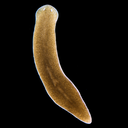Search
About Schmidtea polychroa
The genus Schmidtea comprises four species of freshwater planarians, predominantly found in Europe, with some populations also present in north Africa, Asia and introduced in regions of America [2, 10]. Schmidtea polychroa has a Europe-wide distribution from the Iberian Peninsula [1, 14] and Italy to Southern Sweden in the North [11]. It also occurs in north-Africa and has been introduced into North-America [2].
The life cycle of S. polychroa features two distinct reproductive strategies, associated to different biotypes or chromosomal races [3, 4, 5], and distributed in a geographic pattern:
Diploid (2n) sexual strains are mostly restricted to southern Europe including northern and central Italy, Sardinia, some areas of Spain and France, the Check Republic and Hungary [12,13]. Sexual populations maybe occurs isolated in southern Sweden [11].
Polyploid (3n and 4n) parthenogens are more broadly distributed across the range of the species, and can coexist with sexual populations [12].
Sexual and parthenogenetic individuals are not genetically isolated and can interbreed producing fertile egg capsules [3]. Remarkably, individuals from purely parthenogenetic populations are capable of occasional sex reproduction [6] a trait than can contribute to the success of polyploid strains in colonising central and northern Europe [7]. The species is not fissiparous.
The S. polychroa strain (internal ID: GOE00227) was collected at 43.71249; 16.72605 near the Village of Gala, Croatia.
Picture credit (Creative Commons BY 4.0): Miquel Vila-Farré, Dept. of Tissue Dynamics and Regeneration, Max Planck Institute for Multidisciplinary Sciences
Taxonomy ID 50054
Taxonomy ID 50054
Data source Max Planck Institute for Multidisciplinary Sciences
Variation
This species currently has no variation database. However you can process your own variants using the Variant Effect Predictor:




 More information and statistics
More information and statistics

 Download DNA sequence
Download DNA sequence Display your data in Ensembl Metazoa
Display your data in Ensembl Metazoa

 Update your old Ensembl IDs
Update your old Ensembl IDs
![Follow us on Twitter! [twitter logo]](/i/twitter.png)
